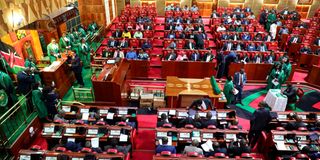Breaking News: At least 10 feared to have drowned in Makueni river
Kingi, Wetang’ula promise end to Senate, National Assembly supremacy wars

MPs take the oath of office at the National Assembly on September 8, 2022. Supremacy battles between the Senate and the National Assembly have delayed the implementation of several legislations, the new senators heard during their retreat.
What you need to know:
- Battles have delayed the implementation of several legislations, the new senators heard during their retreat.
- CS Yatani said differences between the two Houses were to blame for the delay of the legal instrument through which Equalisation Fund allocations are to be transferred to counties.
- Senate Speaker Amason Kingi termed as “unfortunate” previous supremacy battles between the Senate and National Assembly, saying, the flexing of muscles was “unnecessary”.
Supremacy battles between the Senate and the National Assembly have delayed the implementation of several legislations, the new senators heard during their retreat.
To back this assertion, National Treasury Cabinet Secretary Ukur Yatani said differences between the two Houses were to blame for the delay of the legal instrument through which Equalisation Fund allocations are to be transferred to counties.
The Equalisation Fund is an affirmative action legal instrument that seeks to improve certain services in marginalised counties to bring the quality of those services to the level generally enjoyed by the rest of the country.
“The Equalisation Fund Guidelines of 2015 were quashed, leading to a delay in the implementation of the fund. The National Treasury has since prepared the Public Finance (Equalisation Fund Administration) Regulations, 2021, which have been adopted by Parliament to facilitate allocation and transfer of funds,” Mr Yatani pointed out.
The CS called for harmony between the two Houses to help expedite service delivery.
Senate Speaker Amason Kingi termed as “unfortunate” previous supremacy battles between the Senate and National Assembly, saying, the flexing of muscles was “unnecessary”.
He said he has held talks with National Assembly Speaker Moses Wetang’ula and that they had both agreed that such incidents will be a thing of the past.
“We’ve reached an agreement with Mr Wetang’ula; we’ve agreed that in the next five years, the two Houses will work in harmony. We’re all service providers to the people of the Republic of Kenya,” he noted.
“The scenario that we have here is like sending a soldier to the battlefield without bullets,” he said.
“Before either House considers a Bill, speakers of the National Assembly and of the Senate shall jointly resolve any question as to whether [the] Bill concerns counties, and if it is, whether it’s a special or an ordinary Bill,” Senate Clerk Jeremiah Nyegenye said.
He explained that such provisions had often been overlooked, forcing the Senate to go to court on June 18, 2020. He added that Petition No. 284 of 2019, stated unequivocally that the concurrence process under Article 110(3) of the constitution was mandatory and is a condition precedent to the House of Parliament considering a Bill.
Immediate cessation
He further pointed out that the court ordered the immediate cessation of consideration of all Bills that were pending before either House and for which determination by the speakers could not be demonstrated.
“The judgment fundamentally altered the legislative business of the third Senate, as a significant number of Bills, some of which had been considered by the Senate and referred to the National Assembly in 2019, had to be republished in order to comply with the ruling of the court,” Mr Nyegenye said. He asked the current Senate to find a lasting solution to the challenge.





